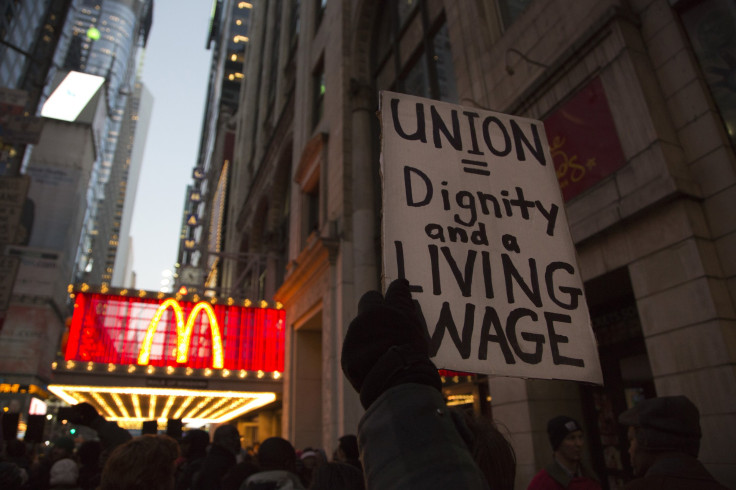Most Of The Benefits Of A Minimum Wage Increase Would Not Go To Poor Households

As the minimum wage debate rages on, research from San Diego State University economist Joseph J. Sabia and Cornell University economist Richard V. Burkhauser shows that most Americans who earn the minimum wage or close to it do not live in poor households and are not the sole income earners in their households.
The conclusion drawn, then, is that raising the minimum wage—a proposal backed by President Obama and (as of Tuesday) 75 economists, including seven Nobel Prize winners—is not a targeted way to help poor people. In other words, raising the minimum wage would help the middle class more than those living around the poverty line.
Only about 5 percent of hourly U.S. workers made the federal minimum wage or less in 2012, according to the Bureau of Labor Statistics. In 2012, the official poverty rate was 15 percent, or 46.5 million Americans.
If the federal minimum wage were increased from $7.25 to $9.50 per hour, only 11.3 percent of workers who would gain from the increase live in households officially designated as poor, Sabia and Burkhauser found and published in the Southern Economic Journal. Some 63 percent of workers who would gain were second or third earners living in households that have incomes equal to three times the poverty line or more, and 42.3 percent of workers who would gain are living in households equal to three times the poverty line or more.
Sabia and Burkhauser used U.S. Census data on household incomes and wages to examine federal hourly minimum wage increases from $5.15 in 2003 to $5.85 in 2009. They also looked at the effects of state minimum wage increases. Between 2003 and 2007, 28 states increased their minimum wages beyond the federal minimum. They found “no evidence that minimum wage increases between 2003 and 2007 lowered state poverty rates.”
Moreover, increasing the minimum wage causes some low-wage workers to lose their jobs because the value of their productivity is no longer high enough for employers to gain by hiring them. Taking this into account, Sabia and Burkhauser conclude increasing the minimum wage is even less effective at reducing poverty.
In the best-case scenario, assuming that a 10 percent wage increase would reduce low-wage jobs by only 1 percent, increasing the federal minimum wage to $9.50 would destroy 468,000 jobs. Another estimate, assuming a 10 percent wage increase would destroy 3 percent of low-wage jobs, means increasing the minimum wage to $9.50 would destroy 1.4 million jobs.
“If that job destruction occurs, the net benefit to households containing low-wage workers would be only $2.63 billion per month, of which only $287 million would be a gain to households in poverty,” David Henderson, a research fellow with the Hoover Institution at Stanford University wrote on Monday for the National Center for Policy Analysis.
Henderson also added that these estimates overstate gains because employers will also offset the minimum wage increase by reducing non-money parts of worker compensation, an effect that government data does not capture.
Sixty-six percent of Americans support an increase in the minimum wage, according to a Dec. 12-15 ABC News/Washington Post poll. Thirty-one percent oppose an increase because they say it could cause some businesses to cut jobs.
© Copyright IBTimes 2024. All rights reserved.






















